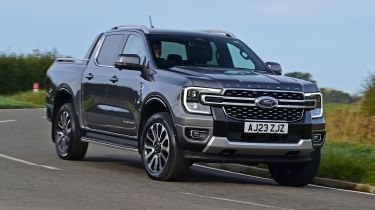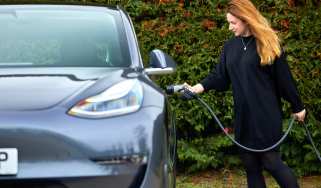Double-cab pickup tax benefits explained 2024
Double-cab pickup trucks can offer company car drivers and small business owners big tax savings – here’s what you need to know

Benefit-in-Kind (BiK) taxation rules provide small business owners and company car drivers with potentially huge savings on vehicles classified as light commercial vehicles (LCVs), including double-cab pickup trucks – sometimes worth thousands of pounds per year.
In February 2024, the UK Government announced plans to change the definition of an LCV to exclude double-cab pickups, essentially classing them as a traditional road car and removing any potential tax savings. Following external pressure from the motoring industry and farmers, the decision was reversed one week later, meaning that company car drivers will still have access to the low BiK tax rates offered by double-cab pickups for the foreseeable future.
To better understand how the BiK system works, read our advice article which covers everything you need to know.
The Benefit-in-Kind tax system for double-cab pickups
Under the UK Benefit-in-Kind tax structure laid out by HMRC, any vehicle with a gross payload capacity of 1,000kg or more is classified as a light commercial vehicle (LCV). 'Gross' payload is calculated by subtracting the vehicle's kerbweight (how much it weighs when unladen but ready for action) from its maximum loaded vehicle weight. As the majority of double-cab pickups can accommodate this cargo payload, they are classified as LCVs.
The rules are less complex for single-cab pickups, which are deemed not to offer the same non-business benefits as double-cab pickups. As such, they're automatically classified as LCVs, as are panel vans with three seats or fewer.
When leasing a company vehicle, the Benefit in Kind (BiK) tax rate for LCVs is fixed at a flat figure of £3,960. This is unlike ordinary passenger vehicles, where the BiK figure is based on the vehicle’s CO2 emissions and its ‘P11D’ list price, with more polluting and more expensive vehicles commanding heftier sums. This BiK figure is then taxed according to your tax band.
Therefore, leasing a company LCV results in a yearly BiK tax bill of £792 per year for 20% taxpayers or £1,584 for 40% taxpayers, regardless of the emissions or the list price of the LCV.
How much money can I save?
The tax saving depends on the car you’re comparing to a double-cab pickup, but as an example, let’s look at the difference between a Ford Ranger WildTrak and a Ford Kuga – both can comfortably seat five passengers.
Starting with the Ford Kuga, we must use the BiK tax rate table provided by HMRC. The Ford Kuga Hybrid with a 2.5-litre engine has a CO2 emission figure of 136g/km, placing it into the 32% BiK rate band. The Kuga’s P11D list price of £42,025 is multiplied by 32%, resulting in a BiK value of £13,448. This figure is then taxed according to your tax bracket, resulting in a yearly bill of £2,690 for 20% tax payers, or £5,379 for 40% tax payers.
The Ford Ranger WildTrak with a 3.0-litre diesel engine has a P11D list price of £54,759. The BiK value of the Ranger is set at the flat £3,960 for all LCVs, and results in a yearly tax bill of £792 for 20% taxpayers and £1,584 for 40% taxpayers.
In this scenario, opting for the double-cab Ford Ranger WildTrak over the Ford Kuga would save 20% tax payers £1,898 per year, and 40% tax payers £3,795 per year, despite its higher list price and CO2 emissions.
This is displayed in the table below, along with some other popular family cars for comparison.
|
Vehicle make/model |
P11D list price |
C02 emissions (g/km) |
BIK % rate |
BIK value |
Annual tax for 20% taxpayer |
Annual tax for 40% taxpayer |
|
Ford Ranger WildTrak 3.0 |
£54,759 |
264 |
Fixed rate |
£3,960 |
£792 |
£1,584 |
|
Ford Kuga ST-Line X 4WD |
£42,025 |
136 |
32% |
£13,448 |
£2,690 |
£5,379 |
|
BMW 320d Touring Sport |
£44,800 |
134 |
31% |
£13,888 |
£2,778 |
£5,555 |
|
Volkswagen Golf Style 1.5 TSI |
£29,245 |
124 |
29% |
£8,481 |
£1,696 |
£3,392 |
Benefits for VAT-registered owners
As the term Light Commercial Vehicle suggests, there are benefits where such a vehicle is bought primarily for business use. If a business is VAT-registered, it can claim a percentage of the LCV's purchase VAT back, depending on how much of its annual mileage can be categorised as business-related. If it's declared that 80% of a pickup's annual mileage will be business-related, for example, 80% of the VAT can be reclaimed.
Non LCV-drivers aren't eligible to claim a VAT refund unless it can be demonstrated that the vehicle is used strictly for business 100% of the time (although limited exceptions apply for vehicles bought for use as taxis, private-hire cars or driver tuition vehicles, for example).
Since business use excludes commuting to and from work, annual commuting mileage would be deducted from any possible VAT refund. However, a business that chose to claim a VAT refund on a non-LCV would be unable to do so if the vehicle spent any time at all in use for commuting.
An LCV owned by a VAT-registered business is also treated in the same manner as 'plant and machinery' when it comes to Capital Allowances. This means that the purchase price of a pickup can usually be written off against annual profit before the business's annual tax is calculated. In contrast, a non-LCV company car may have a capital allowance write-off rate as low as 8% per year.
Pickups and 'Light Commercial Vehicles' (LCVs)
HMRC, the government body responsible for tax collection in the UK, defines a 'light commercial vehicle' or LCV as one that has a maximum cargo payload of 1,000kg or more. The vehicle's maker will publish payload information, and it's important that you look for the 'gross' payload, rather than the 'net' payload – the latter includes a 75kg allowance for the driver.
'Gross' payload is calculated by subtracting the vehicle's kerbweight (how much it weighs when unladen but ready for action) from its maximum loaded vehicle weight. You'll find that the majority of double-cab pickup trucks occupy the LCV category; at the time of writing, every version of the Ford Ranger double cab has a payload of over 1,000kg. You should find payload information in the sales brochure for any new pickup.
However, bear in mind that any removable hard-top load-bay cover added as an accessory will need to be deducted from the pickup's payload.
Check with your accountant
With all aspects of taxation, there are many variables that can influence the liability of an individual or business, and it's always worth seeking the advice of a qualified accountant before making a purchase decision, particularly if you intend to pursue VAT reclamation or capital allowance tax refund.
While this feature aims to make it easier to understand the potential tax advantages of choosing a pickup, it should be regarded as a general overview only.
More on UK car tax...
Recommended

Company car tax 2025: benefit-in-kind (BiK) rates explained

Classic car tax exemption: which historic vehicles qualify?
Most Popular

Omoda E5 targets rivals: now with zero deposit and APR

Ford Puma Gen-E driven: Electric charmer or too little, too late?
Tips & advice

Car dashboard warning lights: what does each symbol mean?

Electric car charging stations: public networks, charger types, apps and maps









